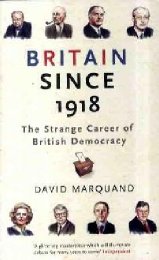Want to understand what makes Blair Tick?
If you have followed the Chilcot enquiry and wish to understand what made Blair tick, then you could not do better than read chapter 11 'Young Lochinvar' (Brave Dawn, High Noon and Slow Dusk) of Marquand's scholarly work. As someone fascinated by the decades that my parents' generation and my own have lived through, I found the book shed new light on the political processes and characters that have shaped my life and those of my family. The paperback edition has a specially-written epilogue that ends the story in the Brown premiership and the credit crunch, so if you wish to follow the unfolding of the processes that have led us to the politics of today, including in Marquand's words the 'draining away' of public confidence in the British version of democracy - itself 'the product of an interplay between top-down reform and bottom-up defiance' (p11) - then you could do no better than buy this book.
Marquand concentrates on the years since the major extension of the suffrage in 1918, but begins the story with a brief overview in which he raises a series of what he calls great questions that have echoed down the ages for governments to this day: "What conception of democracy did the famously unwritten British constitution embody - and what conception ought it to embody? Could the democratic promise of political equality be squared with the economic inequality inherent in capitalism, and if so, how? Who were the British, and how did 'Britishness' relate to the much older national identities of the British isles? Where did Britain fit into the global order and its European subset, and where should it try to fit?" (p3)
These questions have been answered - or attempted to be answered - by four great narratives/traditions that have informed the political conversations over the years - what Marquand calls 'whig imperialist, 'tory nationalist', 'democratic collectivist' and 'democratic republican'. The first of these, epitomised for Marquand in the 18th century figure of Edmund Burke, is 'a story of gradual progress, timely accommodation, responsive evolution and subtle statecraft... a story of balance - between freedom and order, change and stability, rulers and ruled and, not least, central and local power'.
Tory nationalism presents a Hobbesian world of danger and uncertainty, disruption and disorder; it entails a demand for 'order, discipline and respect for tradition' as the outcome of - usually reluctant - change. Tory nationalism is epitomised in the 19th century by the Marquess of Salisbury and his fear of democracy. In contrast, democratic collectivists share a vaguely Marxian determinism and belief in the 'redemptive powers' of the proletariat, but allied to a non-revolutionary gradualism. It manifests itself in a utilitarian Chadwickian/Benthamite approach to progress and reform, coupled with a belief in the powers of the state, and is associated with such names as the Webbs and working class prime minister Ramsay MacDonald. Finally, come the democratic republicans, who as Marquand observes, are the most difficult to pin down - the outsiders, the 'awkward squad' of British politics, associated with the writings of RH Tawney and the rejection of the social engineering associated with the Webbs.
As with all such divisions, the real world according to Marquand is messier, an example being Thatcher, the tory nationalist and outsider iconoclast who saw that the restoration of order demanded far-reaching change after the disorder of the 1970s. In the words of Marquand, 'Her tory nationalism ran alongside a superficially incongruous and largely unrecognised streak of democratic republicanism.' No wonder that her mission to roll back socialism and the frontiers of the state led paradoxically to an increased regulatory role for the latter and the rise of the quangocracy, to coin a neologism. And the law of unintended consequences continued under Blair, whose unfinished business of devolution implied a UK federation - an implication steadfastly not addressed - and storing up trouble for the future. Tam Dalyell's West Lothian question is still not resolved!
All this and lots more - and there's a good reference list and index - you will find in this rich resource as it tracks 'The Strange Career of British Democracy' and the state (in both senses of the word) we are in today.
Written by Ken Giles

































Your Opinions and Comments
Be the first to post a comment!